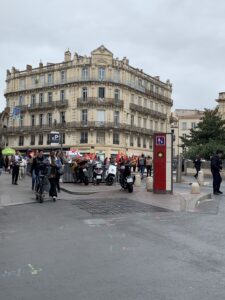By Mandy Barlow in College Days, Feature Story on March 30, 2023
Brockman shares insights into the differences between the French and American educational systems from her semester abroad
In the fall of 2022, Ripon College junior Hannah Brockman embarked on a semester-long educational journey in Montpellier, France — and she learned that education in France is quite unlike the American education to which she is accustomed.
Brockman, who is studying to become a foreign language teacher, chose to attend the Université Paul-Valéry Montpellier to continue her studies. There, she took several foreign language classes and soon realized that education in France is “more freeing” compared with that in the United States.

People walking by Le Palais Idéal in Hauterives, France. Photo Courtesy of Hannah Brockman.
“Most students just have class Monday to Thursday so the weekends are Friday to Sunday. This allows significantly more freedom to get work done, spend time with family, and travel,” Brockman said, adding that “there was never any homework ever,” only that occasional worksheet that was neither graded nor mandatory.
Brockman noted that she was at first slightly disappointed with the lack of structure and homework in her French education because she felt that she had to dedicate more time to practicing on her own. After a few weeks, she began journaling and reflecting on what she understood well and what remained unclear, ultimately finding that doing so “was almost a more effective homework assignment than traditional United States assignments.”
A second significant difference Brockman noted is regarding decreased availability of professors outside of class time, as office hours were non-existent at the French university. Additionally, professors often took over a week to respond to emails from students.
“This is considered acceptable because in France the work week is capped at 30 hours per week, and few if any individuals put even minutes extra into their work. They give their occupation all effort for the 30 hours per week they are on the clock, but nothing outside of that time. The culture is set up to allow this, even for teachers,” Brockman said.

Hannah Brockman posing in front of the Fountain of the Three Graces in Montpellier, France. Photo Courtesy of Hannah Brockman.
During her study abroad, Brockman also encountered differences related to student life, discovering that student life in France largely consists of students going on strike to advocate for change.
“Students and workers are passionate about having better conditions frequently,” Brockman said, adding that in her experience, students had protested the difficulty and expense of finding housing near the university. She found that even protests in France differ from those in the United States, as a 48-hour warning is often issued prior to a strike so that schools can cancel classes to account for the inevitable closed roads the strike will cause.
“There are no weather days in Montpellier because they still drive if the roads are flooding with water, but the moment folk flock the streets preventing circulation, everything comes to a halt!” Brockman joked.

A crowd walking around Place de l’Opera in Paris, France. Photo Courtesy of Hannah Brockman.
A final difference Brockman found is that public transportation is very accessible in France and other European nations. She noted that the ease of traveling via public transportation came as a culture shock to her: “One time I decided that in a few weekends, I was going to Barcelona, and it took me all of a half hour to book the FlixBus [an intercity bus service] and a hotel.”
In part due to the many differences between the French and American way of life, especially in regard to university life, Brockman decided that she wants to return to finish her education.
“I plan to return to France in the next five years to attend Université de Nîmes for a master’s degree,” she said.


